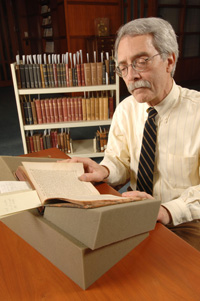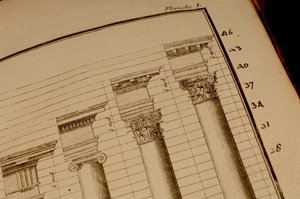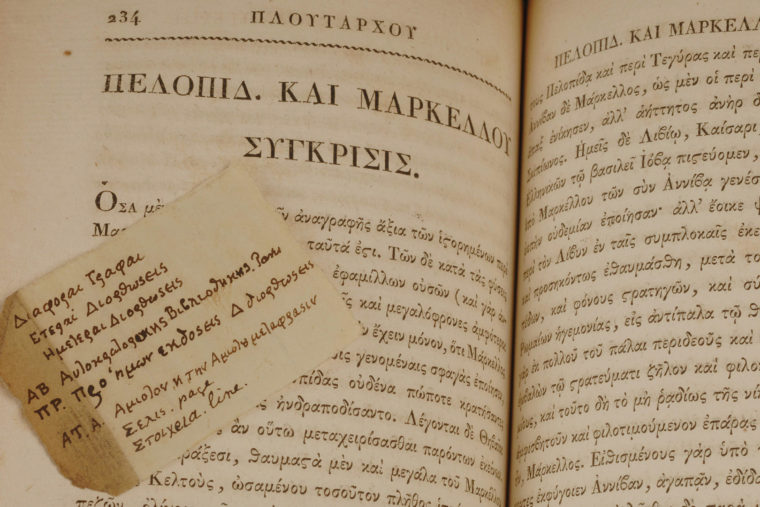The Thomas Jefferson Foundation and Washington University in St. Louis announced the discovery by Monticello scholars that a collection of books, long held in the libraries at Washington University in St. Louis, originally were part of Thomas Jefferson’s personal library.
These books, held at the university’s libraries for 131 years, have been confirmed by Monticello scholars as having belonged to Thomas Jefferson himself. They are part of the university’s rare books collection, and were not identified by the books’ donor in 1880 as a part of Jefferson’s personal collection.
Monticello scholars identified several notable books among the 28 titles and 74 volumes, including:
- Aristotle’s Politica, which was likely one of the last books Jefferson read before his death on July 4, 1826.
- Architecture books used by Jefferson to design the University of Virginia, which, like Monticello, is recognized by the United Nations as a World Heritage Site. Two of these volumes, Freart de Chambray’s Parallele de l’architecture antique avec la moderne and Andrea Palladio’s Architecture de Palladio, contenant les cinq ordres d’architecture contain a few notes and calculations made by Jefferson.
- A small scrap of paper with Greek notes in Jefferson’s hand tucked in a volume of Plutarch’s Lives.
“This is a wonderful discovery for Washington University and one of great significance to all scholars of American history,” says Mark S. Wrighton, chancellor of Washington University.
“It is my hope that over time, this collection will help students and researchers better understand Thomas Jefferson and the literature that shaped his thinking about the world during the 19th century,” Wrighton says. “This discovery underscores the important role all libraries play in preserving the great works of our past.”
“Our discovery provides an amazing and intimate look into Jefferson’s world. To find his handwritten notations is like peering over Jefferson’s shoulder to see his mind at work,” says Leslie Greene Bowman, president of Monticello and the Thomas Jefferson Foundation. “To uncover such a significant collection of Thomas Jefferson’s personal books is a breakthrough for scholars and ongoing research on Jefferson’s life.”

With this discovery, Washington University is now the third-largest holder of Jefferson’s books, after the Library of Congress and the University of Virginia. This find establishes a new connection between Washington University and the ongoing research at Monticello, the center of Jefferson scholarship in Charlottesville, Va.
“Washington University is thrilled to have secured and preserved these volumes since 1880,” says Shirley K. Baker, vice chancellor for scholarly resources and dean of University Libraries at WUSTL. “It is particularly appropriate that these books should be here in Missouri. It was Jefferson who acquired this land in the Louisiana Purchase, and St. Louis was the jumping-off point for the expedition Jefferson sent to explore the new territory.”
David Konig, PhD, professor of history in Arts & Sciences and of law at Washington University in St. Louis, is a leading authority on Thomas Jefferson and the development of law in colonial, Revolutionary and early national America. He was “very excited” to hear of the find.

“Jefferson’s mind had a seamless, all-encompassing quality, making the kind of connections typical of an Enlightenment thinker. What he read in one field he would apply to his thinking in another. Each of these volumes will be of interest to at least five different scholars in at least five different fields,” says Konig, who is editing Jefferson’s Legal Commonplace Book and writing a book on Jefferson’s legal thought and practice, Nature’s Advocate: Thomas Jefferson and the Discovery of American Law.
Jefferson’s books were auctioned off in 1829 after his death to settle debts on his estate, Monticello.
There are no known surviving records of the buyers, but a letter from Jefferson’s grandson-in-law, Joseph Coolidge, included a detailed listing of books he and his wife Ellen Wayles Coolidge wished to purchase from the sale.
The books were discovered by International Center for Jefferson Studies scholar Ann Lucas Birle, who found an article from 1880 that noted that the Coolidge family donated their library to Washington University. She shared this information with her colleague Endrina Tay, who has been tracking down all of the books Jefferson owned, read and recommended during his lifetime.
At Washington University, rare books curator Erin Davis and assistant archivist Miranda Rectenwald tracked down the books donated by the Coolidge family, which since had been dispersed among the library’s holdings, with the help of a ledger dating to the turn of the 20th century that catalogued the collection.
Tay, who is building a publicly accessible inventory of Jefferson’s libraries, was able to authenticate the books by identifying the presence of Jefferson’s distinctive handwritten ownership mark in these books: Before the “I” in a book’s signature, Jefferson would add a capital “T”. After the “T” in a book’s signature, he would add a capital “I.”
Jefferson used an “I” instead of a “J” because, in early printed books, the letters “I” and “J” were considered different forms of the same letter.
The collection of Jefferson’s books, which are in French, Greek, Italian, Latin and English, includes volumes on the classics, history and architecture. The books are held within the University Libraries’ Special Collections.
“In addition to Washington University’s own faculty and students, the Washington University Libraries welcome researchers from around the world to work with these newly identified volumes,” Baker says.
For more information about viewing the Jefferson collection, call Washington University Libraries’ Special Collections at 314-935-5495.
About Monticello
Monticello is owned and operated by the Thomas Jefferson Foundation Inc., which was founded in 1923. As a private, nonprofit 501(c)3 corporation, the foundation receives no ongoing federal, state or local funding in support of its dual mission of preservation and education. For more information, visit monticello.org.
About Robert H. Smith International Center for Jefferson Studies (The academic center of the Thomas Jefferson Foundation Inc.)
The purpose of the International Center for Jefferson Studies (ICJS) is to foster Thomas Jefferson scholarship and disseminate findings through research and education. Through a network of scholars, teachers and resources, the ICJS engages a global audience in a dialogue about Jefferson’s ideas and establishes relationships with people from around the world. ICJS takes an active role in the international study of Jefferson and his legacy by supporting a wide range of inquiry and programs in Charlottesville, Va., and abroad. The center helps to define new areas of investigation and encourages the application of new technologies.
